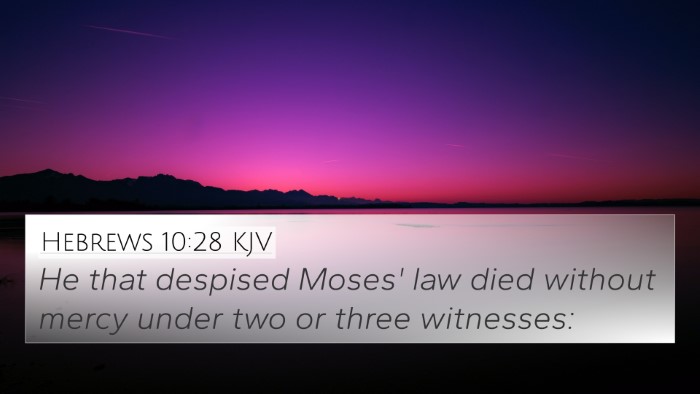Understanding John 8:17
John 8:17 states: "In your own Law it is written that the testimony of two witnesses is true." This verse underscores the importance of witness in the validation of truth. Below is a comprehensive summary of its meaning, incorporating insights from public domain commentaries.
Meaning and Context
In this passage, Christ emphasizes the validity of His claims by appealing to the Jewish Law, which mandates that the testimony of two witnesses is necessary to establish a matter as fact. This principle, found in Deuteronomy 19:15 and reiterated in Matthew 18:16, showcases the judicial foundation that Jesus builds upon. He contrasts the earthly judgment based on the law with the divine authority He possesses.
Commentary Insights
-
Matthew Henry:
Henry highlights the judicial aspect of Jesus’ argument. He notes that Christ utilizes the Law to substantiate His claims, thus demonstrating the consistency of His message with Scripture. By referencing the necessity of witnesses, Christ also reveals the inadequacy of those who oppose Him, as they fail to recognize the truth even when presented by the Law.
-
Albert Barnes:
Barnes elaborates on the significance of Jesus being both the subject and witness of His own testimony. He emphasizes that the presence of a second witness could be understood in the person of John the Baptist, who bore witness to the light, thus supporting Jesus’ claims. Barnes encourages readers to see this as an invitation to acknowledge the witness of the Scriptures alongside Christ’s testimony.
-
Adam Clarke:
Clarke points out the Jews' reliance on their Law and traditions, which creates a compelling backdrop for Jesus' reference to it. He argues that while the Law was to guide them, their inability to recognize its fulfillment in Christ signifies their moral blindness. Clarke suggests that the reference to witnesses also serves as a challenge to those listening, compelling them to consider their understanding of truth.
Bible Cross-References
To deepen your understanding of John 8:17, consider the following Bible cross-references:
- Deuteronomy 19:15: Establishes the principle of testimonies.
- Matthew 18:16: Affirms the same testimony requirement in ecclesiastical settings.
- John 5:31: Jesus speaks of self-witness and the need for external affirmation.
- John 8:14: Jesus claims knowledge of where He comes from and where He is going.
- 1 John 5:9: The testimony of God is greater than that of men.
- John 1:7: John the Baptist came as a witness to testify about the Light.
- Revelation 1:2: John bore witness to the word of God and the testimony of Jesus Christ.
- Acts 1:8: The call to be witnesses to the end of the earth.
- Romans 8:16: The Spirit bears witness with our spirit that we are the children of God.
- 2 Corinthians 13:1: Establishing every word in the presence of two or three witnesses.
Thematic Connections
This verse exemplifies the need for authority in testimony and serves as a foundation for understanding Biblical verification. Thematic connections can be observed across Scripture that reinforce this legal standard:
- Validity of testimony in establishing truth.
- The role of culture and law in spiritual understanding.
- Jesus’ authority as the ultimate witness.
Practical Application
In studying this verse, believers can gain insights into how to approach spiritual truths and the importance of seeking corroboration from Scripture. Cross-referencing Biblical texts enhances understanding as it allows for a holistic view of Christian claims. Key tools for Bible cross-referencing, such as a Bible concordance or a cross-reference guide, can greatly aid in this process.
Conclusion
John 8:17 serves as a profound reminder of the principle of witness as established in both Old and New Testament scriptures. By exploring the connections between Bible verses, Christians can deepen their understanding of the teachings of Jesus, enhancing their spiritual journey through scriptural cross-references. The systematic study of related verses not only enriches knowledge but also fosters a deeper faith rooted in the truth of God’s Word.














